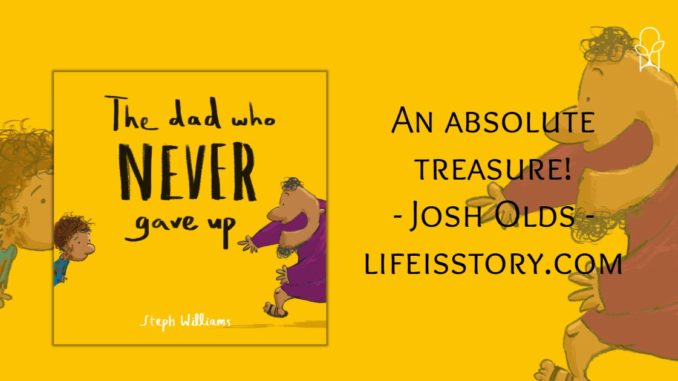
Also by this author: The Boy Who Shared His Sandwich, The Easter Fix, The Little Man Whose Heart Grew Big, The Dad Who Never Gave Up, The Little Man Whose Heart Grew Big, The Christmas Surprise, Little Me, Big God: Stories about Jesus: Eight True Stories from the Bible
Published by Good Book Company on October 1, 2021
Genres: Children's, Bible Stories
Buy on Amazon
Goodreads

Once there were two brothers. The little brother took his dad's money and spent it all. He ended up so hungry that he wanted to eat pigs' food. Yuck!What happened when the little brother went home to his dad? Find out in this exciting story that Jesus told.
In this engaging retelling of the parable of the prodigal son, young children discover how God is like a dad who never gives up on us, and who is ready to welcome us home with open arms. It's not because we are good. It's because God's love is so big!
Notes for parents at the back help to explain the details of this account from Luke 15:11-32.
One of my pet pastoral peeves is that the famous parable in Luke 15 is called “The Prodigal Son,” because the focus shouldn’t be on the son. It’s about the father and his two (not just one) lost children. Whenever I’ve preached on the topic, I’ve always called it “The Running Father.” Well, just look at the title and cover of this installment of the Little Me, Big God series: the father is running toward his son with the title in big, bold script The Dad Who Never Gave Up.
Like the other entries in this fantastic series, Steph Williams gets right to the point in language that’s simple and accessible, whether being read to pre-readers or given to early readers. Right from page one, Steph gets something right that many people miss: there are two brothers and they both get their father’s inheritance. The younger brother takes his money and splits, using it all on fancy living.
You know the story. The younger brother ends up going back home, but he’s got this idea that he’s going to have to be his father’s slave. I don’t think I can be his boy anymore. I don’t think he will want to be my Dad anymore. And there’s an illustrated overlay of an angry father hanging above the younger brother’s sad and worn-out person.
But the Father had been waiting and watching and he brings his own back into the family. The last few panels turn to an interpretation. Did you know that you and me are like the little brother? I would have liked for the theological interpretation to be a bit more robust. Because, truthfully, most of us church kids are more like the older brother. We have received all the benefits of being “close to God” while not really being close to him. The story ends with one relationship restored, but the other relationship—with the older brother—revealed as broken. That’s a lot for a little kids’ book. I get it. So I won’t criticize this book glossing over that aspect too much. But still, that’s all that keeps this book from perfection. And, in the notes for grown-ups at the end, the book makes reference to this aspect. This is a beautiful, wonderful series and should be shared.
